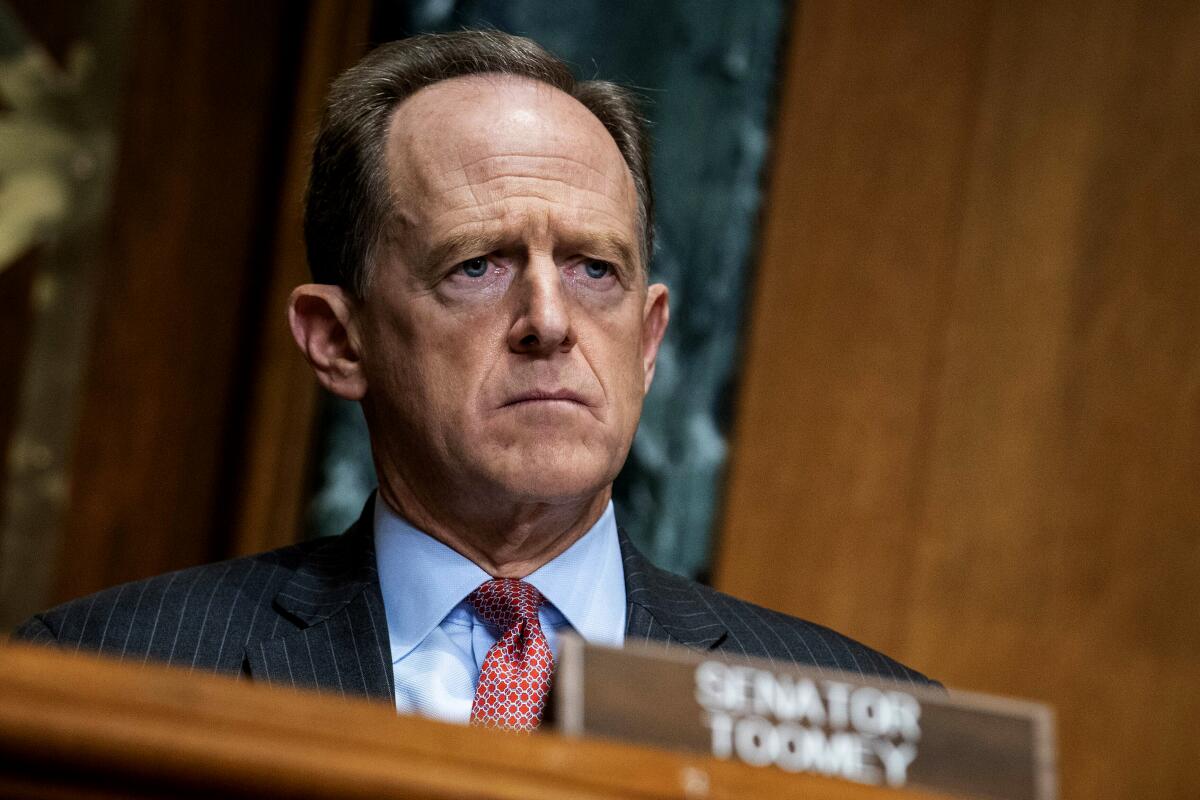Opinion: Congress should reject the false ‘true lender’ rule

- Share via
President Trump pushed his administration to eliminate rules rather than to adopt them, and many of its regulators took that to heart — especially the ones that oversee the financial industry. The Office of the Comptroller of the Currency, which helps oversee banks, even found a way to undercut state lending strictures through a rule it issued in October 2020: the “true lender” regulation, which enabled predatory lenders to evade state interest rate caps by partnering with out-of-state banks.
Congress can overturn this rule, but at least one chamber has to start the process by passing a resolution of disapproval by May 21. This week, the Senate may take up a proposal by Sens. Chris Van Hollen (D-Md.) and Sherrod Brown (D-Ohio) to cancel the OCC’s disingenuously named rule. If senators vote in the interests of their state and not their party, it will pass easily, as it should.
More than 40 states have enacted usury laws that cap interest rates, typically at or below 36% per year. Their ranks include deep red states such as Texas and South Carolina, as well as deep blue California, which after years of allowing predatory rates by companies making unsecured loans, finally put a 36% cap on loans of $2,500 to $10,000 in 2019. (Sadly, payday loans of up to $300 remain exempt in this state.)
The rate caps weren’t aimed at conventional banks, which aren’t usually players in the ultra-high-interest-loan game (bank regulators, including the OCC, frown on these loans). Instead, they targeted “non-bank lenders” such as Curo and World Business Lenders that offer loans with triple-digit interest rates to people with poor credit and no access to conventional financing.
In response to those state rules, however, some non-bank lenders have teamed with nationally chartered banks in the few remaining states without interest-rate caps — Utah, for example — to continue peddling loans with interest rates well above 100% per year to borrowers nationwide. Under these “rent-a-bank” arrangements, the non-bank lender will do the marketing (often online), attract customers and approve loans, which it will send to its bank partner to fund — and then the bank will sell the loans to the non-bank lender, collecting a profit and wiping its hands clean of the transaction. The non-bank lender then collects the payments; its banking partner is little more than a vault it dips into for cash.
At issue here is who the lender really is. Under the longstanding “valid when made” doctrine, a loan made validly by a bank under one state’s rules can be sold to an entity in another state and still be considered valid, even if the loan’s terms don’t comply with the other state’s rules. But consumer advocates argue persuasively that rent-a-bank schemes are the sort of evasion that courts have been rejecting for more than a century. The bank isn’t the true lender in these transactions, the non-bank lender is.
The OCC rule goes the other direction, declaring that a bank becomes the true lender if its name is on the loan documents. In a letter to congressional leaders, a coalition of consumer and civil rights groups complained that under the new rule, “the non-bank lender could control all interaction with the borrower, take on virtually all of the risk, reap the vast majority of the profits, but could ignore state laws that apply to nonbank lenders.” They added, “The OCC final rule will leave states with no ability to protect their interest rate caps, leaving usury laws — in the words of Chief Justice Marshall — a ‘dead letter.’”
Supporters of the rule argue that the OCC needed to clarify the true lender rule because of a 2015 appeals court ruling in New York that seemed to weaken the valid-when-made doctrine, which in turn could discourage banks from making loans. They add that the rule will make banks overseen by the OCC clearly responsible for the loans issued in rent-a-bank schemes, which, given the OCC’s see-no-evil history on this issue, isn’t the least bit reassuring.
At a Senate Banking Committee hearing on the rule, Sen. Patrick J. Toomey (R-Pa.) also defended the lenders who evaded state interest rate caps, saying they were helping borrowers, not exploiting them. “Price controls restrict the credit supply and make it harder for low-income consumers to access needed credit,” Toomey said, substituting his own judgment on that issue for that of the lawmakers in every state that has usury laws.
Toomey’s defense is a common rationalization for allowing predatory lenders to extract triple-digit interest rates from desperate borrowers — “These folks need access to credit!” But that’s akin to saying that grocery stores should be allowed to sell spoiled food because people need to eat. Access to a debt trap is not access to credit, which is why dozens of consumer advocacy groups categorically reject the argument that the government needs to tolerate predatory loans because some people might be desperate enough to take them.
State lawmakers and voters across the country have approved the interest-rate caps that the OCC rule would allow non-bank lenders to evade. Congress should reject the rule and let states safeguard the interests of the borrowers who live within their borders.
More to Read
A cure for the common opinion
Get thought-provoking perspectives with our weekly newsletter.
You may occasionally receive promotional content from the Los Angeles Times.











